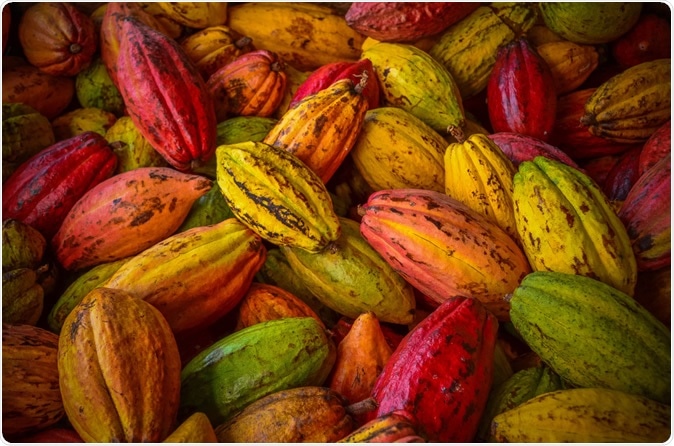Someday, according to a new study, doctors might prescribe chocolate or cocoa to help patients with peripheral arterial disease to walk easier. The study published in February 2020 in the journal Circulation Research of the American Heart Association (AHA) reports a significant improvement in walking distance in patients following regular cocoa consumption.

Cocoa pods. Image Credit: Andysartworks / Shutterstock
Peripheral artery disease (PAD) is a condition in which the blood flow to the legs is reduced. It affects well over 8 million people the world over who are 40 or above. The individual with PAD finds it difficult to walk, with pain, tightness, cramps, and weakness of the leg muscles occurring while walking.
The researchers say that mitochondria within the leg muscle fibers are damaged, along with reduced blood flow and perhaps because of it. Mitochondria are the part of the cell that burns up food molecules in a controlled fashion to release the energy. Their level of activity and their health are linked to the patient’s ability to walk better.
The study
The study was carried out in 44 patients with peripheral arterial disease, all aged over 60 years. Half of them were randomly assigned to a beverage containing cocoa rich in flavanols, that is, with 15 g of cocoa and 75 mg epicatechin. The cocoa used was the common unsweetened cocoa powder that has a high epicatechin content. Either milk or water was mixed with the contents of one packet of this powder. The beverage was consumed three times a day for six months.
The other group drank a placebo mix in which there was no cocoa or flavanol.
The participants were tested in a 6-minute walking test first at baseline and then at six months. The test was repeated 2.5 hours and 24 hours after the beverage. They also underwent a treadmill walking test. Magnetic resonance imaging (MRI) was used to measure blood flow to their legs. In those patients who gave their consent, a calf muscle biopsy was also taken to assess muscle health.
The findings
The participants found that patients who had taken the cocoa were walking an average of about 43 m more than they did at the beginning of the study, at 2.5 hours after drinking their cocoa on the last day of the study. Blood flow to the calves was also better in this group, as well as calf muscle function. The mitochondria were more active; the muscles contained a higher capillary density and the calf muscle healthier.
On the other hand, in the placebo group, the patients walked less, by an average of about 24 m, at the same time point. This corresponds to the untreated PAD profile, where people tend to walk less during the 6-minute test as time goes by.
The researchers observed a lack of effect on the amount of time the patients could walk on the treadmill. However, this measure is less important to the daily life activities of PAD patients because treadmill walking and the 6-minute walking test does not measure the same thing. The latter assesses the type of walking that occurs in daily life. It is, therefore, a more accurate picture of the potential outcome with this therapy in patients with PAD.
Implications
Exercise is known to increase the walking ability in PAD patients. Now it seems that cocoa may join the list of inexpensive and widely available aids for this patient group.
The results are remarkable because, in the words of researcher Mary McDermott, “Few therapies are available for improving walking performance in people with PAD.” The better mitochondrial activity and muscle health in the calf muscles of the patients may be due to the action of epicatechin, which is one of the major flavanol components in cocoa but is found at higher levels in dark chocolate which is 85% cacao compared to milk chocolate. Ordinary chocolate bars are unlikely to produce this effect due to the lower content of epicatechin.
Flavanols, including other catechins and procyanidins, are also richly found in grapes and red wine, as well as in tea. However, cacao beans are among the most abundant sources of flavanols. These polyphenolic plant compounds have a beneficial effect on plant health.
PAD expert Naomi Hamburg says about the lack of blood supply to the calf muscles that result in injury-related to PAD, “Patients with PAD have difficulty walking that is as bad as people with advanced heart failure. In this study, cocoa appeared to be protecting the muscle and improving metabolism.”
The study has its limitations: the sample size was small, and the number of participants in each group was dissimilar in terms of sex, body mass index, and ethnicity. The diet pattern in each group was also unknown, which made it impossible to measure the overall consumption of dietary constituents.
On the other hand, McDermott says, “If our results are confirmed in a larger trial, these findings suggest that cocoa, a relatively inexpensive, safe and accessible product, could potentially produce significant improvements in calf muscle health, blood flow, and walking performance for PAD patients.” Hamburg agrees, saying, “We will need larger studies to confirm whether cocoa is an effective treatment for PAD, but maybe, someday, if the research supports it, we may be able to write a prescription for chocolate for our patients with PAD.”
Journal reference:
Cocoa to Improve Walking Performance in Older People With Peripheral Artery Disease: The Cocoa-Pad Pilot Randomized Clinical Trial Mary M. McDermott , Michael H Criqui , Kathryn Domanchuk , Luigi Ferrucci , Jack M Guralnik , Melina Kibbe , Kate Kosmac , Christopher M Kramer , Christiaan Leeuwenburgh , Lingyu Li , Donald M. Lloyd-Jones , Charlotte A Peterson , Tamar S Polonsky , James H Stein , Robert Sufit , Linda V Van Horn , Francisco J Villarreal , Dongxue Zhang , Lihui Zhao , and Lu Tian, https://www.ahajournals.org/doi/10.1161/CIRCRESAHA.119.315600